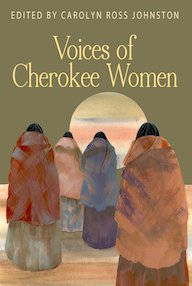Voices of Cherokee Women
Edited by Carolyn Ross Johnston. John Blair, 2013. 295 pages. $12.95.
By David Madden
The voices of Cherokee women speak to us through letters, diaries, newspaper articles, and interviews. Carolyn Ross Johnston creates a context for those vibrant voices by drawing upon ancient native American myths and the writings of travelers, traders, and missionaries who visited them or lived among them from the sixteenth to the nineteenth century.
Johnston asks readers first to listen to the ancient Cherokee story-tellers who kept alive the tales of how the world was made and the creation of the first fire, which was still burning in embers on the Trail of Tears and burns even as the women speak today.
Then came the white man, English and French, James Adair, Henry Timberlake, John Haywood, Louis Philippe, whose own voices describe the women as either exploited or as proud, promiscuous, Amazonian warrior leaders who needed Christ to mend their barbarous ways.
The Cherokee Female Seminary was a showcase for the “civilizing” of Cherokee girls; their curriculum was the same as for women at Mount Holyoke. Catharine [sic] Brown is a paragon of the success of the civilizing era. A Christian convert, she “epitomized the virtues of piety, purity, submissiveness, and domesticity and symbolizing the tame of female sexuality.” In her diary, she laments repeatedly the least deviation as a woman from the Christian ideal.
Given the fact that the history of Cherokee women has been a time of tears ever since they set out upon the Trail of Tears, it is painfully apt that this publication was timed for the 175th anniversary of that event. It is one of the most infamous chapters in this nation’s history, somewhat comparable to Turkey’s expulsion of Armenians, many of whom died on the trek into the desert region of present day Syria.
In “The Trail of Tears” section, in vivid and moving detail, fourteen women speak, some of them in interviews haunted by what their mother or grandparents told them. Speaking in the late depression, Kate Rackleff suffered the memory of her mother telling her that “many died from exposure on the trip … a third of those who started died on the way.” Bettie Perdue Woodall’s mother told her that an officer in charge of one of the wagons, irritated by the crying of a newborn baby, “dashed its little head against a tree and killed it.”
Having devoted forty-five pages to The Trail of Tears, which divided the nation into western and eastern compressed sections, the Oklahoma Territory and the Tennessee-North Carolina Great Smoky Mountains, Johnston devotes seventy-five pages to the plight of women during the Civil War, which divided each section again as some ironically sided with the slave-holding Confederacy, others with the Union that betrayed them. Slaves of the Western Cherokee plantation owners revolted, taking horses and household goods; Native Americans from other tribes often attacked Cherokee women who were left alone. “Cherokee and black women interacted with each other in complex ways before and throughout the Civil War,” writes Johnston. “Most Cherokee women expressed no support for the ideals of either the Union or the Confederacy…. The loss of so many husbands and fathers was a devastating blow psychologically, economically, and politically.”
An aspect less dramatic than the Civil War but profoundly pernicious was the program of land allotment in the Oklahoma Territory, an “orgy of plunder and exploitation perhaps unparalleled in American history”—a phrase Johnston quotes from a book by Angie Debo.
The program for the assimilation of women into Christian civilization was conceived as benign, but the ultimate effect was the ruination of the culture of many Cherokee women, while others maintained traditional ways.
Ending on a positive high note, Johnston asks readers to listen to today’s leading Cherokee women: Isabel Cobb, Aggie Ross Lossiah, and Wilma Mankiller, first woman elected principal chief. “Cherokee women are more concerned about competency,” Mankiller says, “than whether a woman is leading the nation.” Her two elections “were a step forward for women and a step into the Cherokee tradition of balance between men and women.” Having listened to the sixty or women, many readers may feel inclined to count Carolyn Ross Johnston among those leaders.
David Madden (ΦBK, University of Tennessee, 1979) is a novelist and resident member of the Epsilon of Tennessee chapter of Phi Beta Kappa. Madden’s Civil War novel, Sharpshooter, depicts, in part, the tribulations of a slave of a Cherokee plantation owner. His book of essays The Tangled Web of the Civil War and Reconstruction will be published in 2015. His fourth collection of stories, The Last Bizarre Tale, will appear in August 2014.
